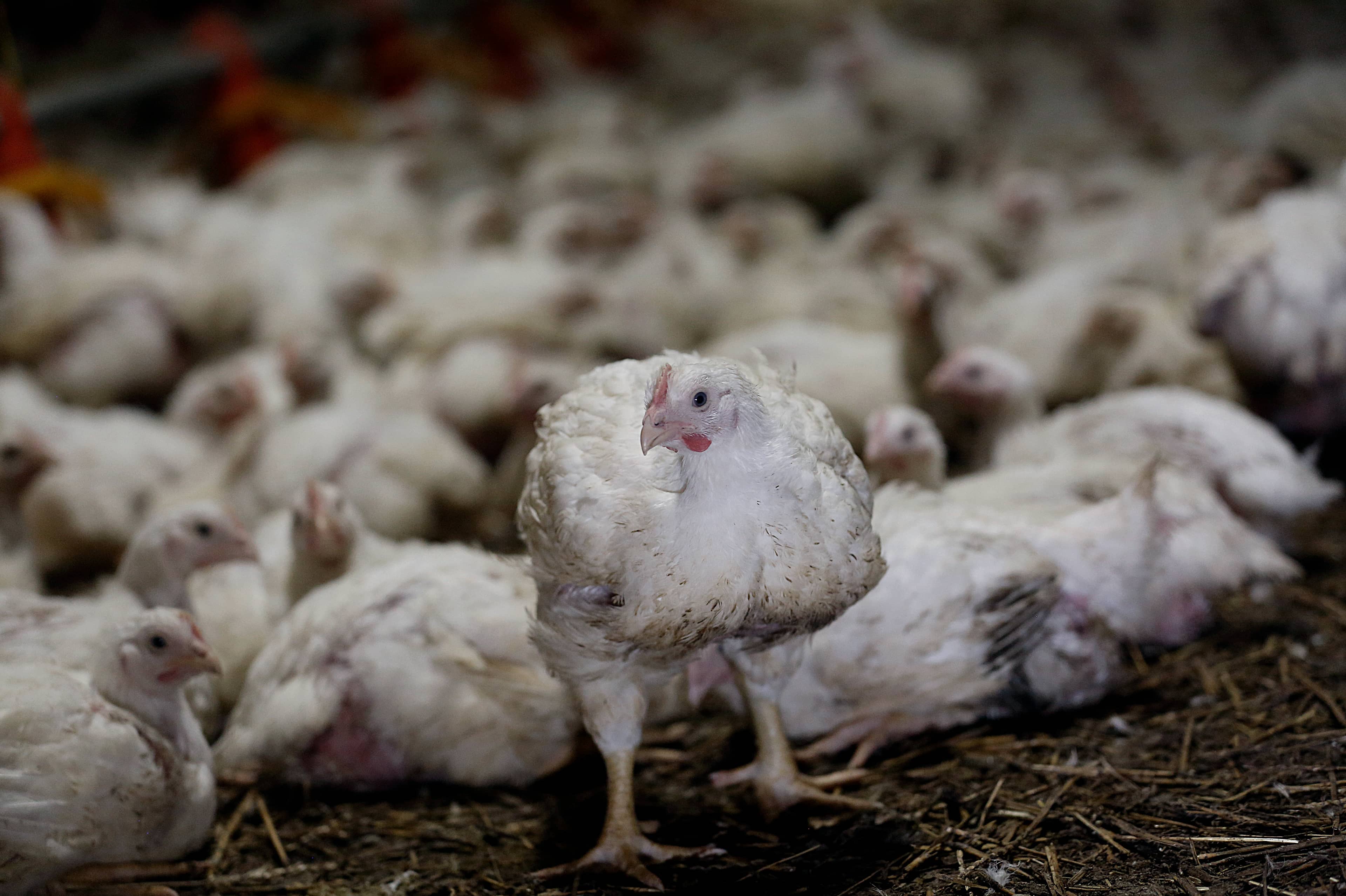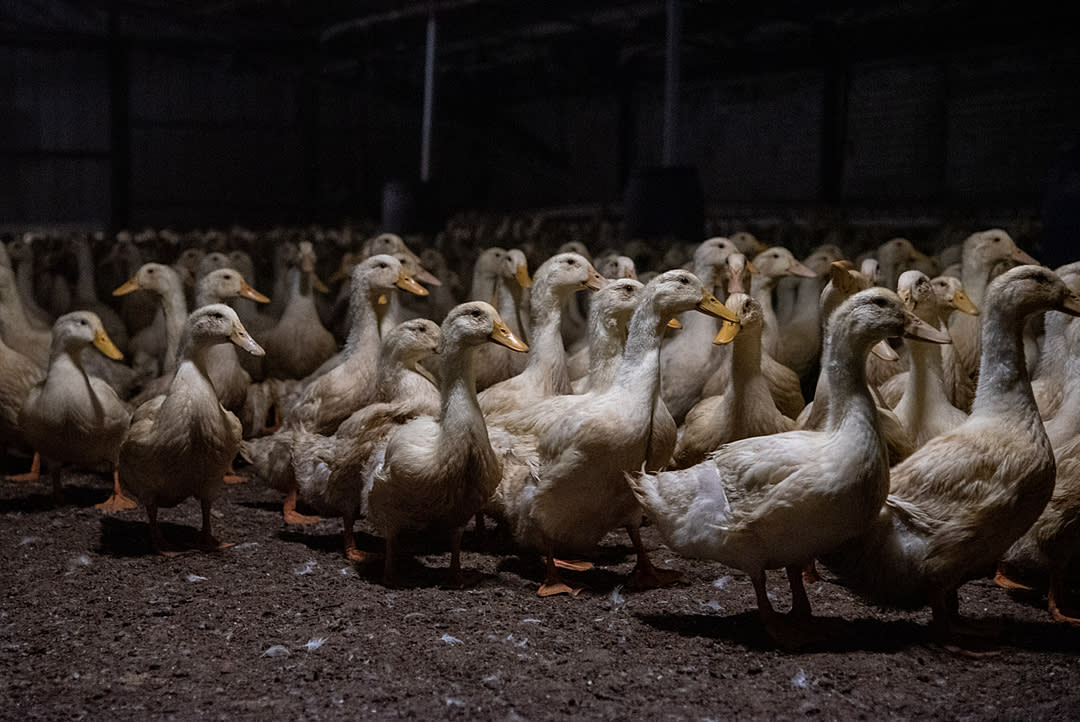




Don’t be fooled by labels like "hormone-free" or "steroid-free" on chicken products at the supermarket. Factory farms are still unnaturally enhancing the growth of billions of chickens every year.

It’s a common misconception that chickens raised for consumption—often known as “broiler chickens”—are pumped full of artificial growth hormones or steroids to make them plumper. While the vast majority of Americans believe this to be the case, it’s just not true.
It's a common misconception that chickens raised for consumption—often known as "broiler chickens"—are pumped full of artificial growth hormones or steroids to make them plumper. While the vast majority of Americans believe this to be the case, it's just not true.
There are several reasons why growth hormones are not used on broiler chickens, but it's not because big factory farms care about our health or the welfare of chickens. Thanks to regulations from the FDA, poultry producers are prohibited from injecting their birds with hormones and steroids.
Even if they were allowed to, however, they most likely still wouldn't do it. According to the University of ArkansasDivision of Agriculture, injecting millions of chickens each year with artificial growth hormones would be too inefficient and costly to do on a large scale. Since hormones are not effective when added to feed or water, they would need to inject them almost every day. That would cost factory farms too much in added expenses, labor, and time.
So when you see a bag of frozen chicken strips at the grocery store bragging that their product contains no added hormones or steroids, remember that this isn't anything special. Considering that it's illegal for farms to give chickens hormones in the first place, these labels are simply a misleading marketing tactic.
It's no misconception, however, that broiler chickens are far bigger than they used to be. Instead of using hormones or steroids, the poultry industry has created bigger birds through the use of antibiotics and years of "selective breeding." Selective breeding is the process of breeding two animals with desirable qualities so that their offspring will have those traits as well. In the case of broiler chickens, they've been selectively bred to grow unnaturally large at a very fast pace, 300% faster than chickens in 1960.
Due to intense breeding practices and liberal use of antibiotics, chickens today have much bigger appetites, and their bodies are extremely efficient at converting the food they eat into breast meat. This partly explains why chicken products have become such popular and inexpensive items in restaurants and grocery stores across the country. However, this also contributes to the pain and suffering that millions of broiler chickens face every day. The conditions these intelligent, emotional birds face on factory farms is already horrific enough. Forcing chickens to grow as large as they do—some get so big that they can't even manage to stand up—only makes things worse, predisposing them to a host of health problems that will ail them through life.
Why are hormones found in food?
To understand why hormones are found in our food, first we need to make sure that we understand what hormones are. Medline Plus defines hormones as our bodies' "chemical messengers," which travel through our bloodstreams to tissues and organs. Hormones—like testosterone, estrogen, and cortisol—play an important role in our growth and development, metabolism, reproductive system, and mood.
Just like in humans, hormones are found naturally in both plants and animals. Whether we're eating a plant-based diet or one that includes animal products, it's important to understand the effects that certain foods can have on our overall hormonal balance.
Are hormones found in plant-based foods?
Just like in humans, plant growth is regulated by hormones, and eating a plant-based diet can have a number of effects on our own bodies' hormones.
For example, there's been a fair amount of debate in recent years over the consumption of soy products. Some have said that eating and drinking soy-based alternatives (like tofu or soy milk) to animal products can bring a multitude of health benefits like fighting against osteoporosis, hot flashes, as well as breast and prostate cancer. However, others have made the unsubstantiated claim that consuming too much soy can actually cause health problems like breast cancer, thyroid issues, and dementia.
The disagreement over soy's safety centers around the product's high concentration of isoflavones, a compound similar in function to human estrogen, but with much weaker effects. Isoflavones bind to estrogen-receptors and can either mimic or block the effects of estrogen in our bodies. There is ongoing research on how soy can affect our own hormonal balance and overall health, but for now, Harvard University's School of Public Health has concluded that regularly eating soy foods is "likely to provide health benefits—especially when eaten as an alternative to red and processed meat."
Are hormones found in animal products?
Yes, animals raised for consumption like broiler chickens and beef cattle naturally have hormones in their bodies like estrogen and testosterone. Furthermore, the FDA has allowed farmers to inject cows raised for beef with some growth-quickening hormones, but that option remains off the table for chicken farmers. Whether it's from a natural or synthetic source, eating animal products—such as dairy, meat, and eggs—means consuming the hormones in these animals' bodies as well.
In particular, researchers have taken a keen interest in how human health is affected by consuming the naturally occurring hormones in chickens. Estrogen consumption is a primary concern, because the compound is identical in a chicken's body as it is in a human's body. Elevated levels of estrogen through consumption of chicken products has been connected to health problems later in life, like breast cancer and polycystic ovary syndrome.
Are hormones or steroids added to chicken?
Given how heartless factory farms can be in their pursuit to profit off of animal suffering, it might be surprising to learn that they do not inject chickens with any sort of hormones or steroids. This is because they're not allowed to.
Since the 1950s, the FDA has refused to sign off on injecting chickens, other poultry, dairy cows, veal calves, or pigs with hormones of any kind. The regulatory body has, however, allowed beef cattle and sheep to get injected with a number of hormones including natural estrogen, progesterone, testosterone, and their synthetic versions. According to the FDA website, "these drugs increase the animals' growth rate and the efficiency by which they convert the feed they eat into meat."
What are chickens injected with to make them bigger?
Thanks to restrictions from the FDA, we can rest assured that chickens are not receiving injections to make them grow bigger or faster. However, chickens today are still much bigger than they used to be. This is because, even though factory farms don't give chickens artificial growth hormones, they used other, less regulated tactics to make chickens grow as large as possible.
One study compared a chicken breed from 1957 to a breed from 2005 and found that the more modern chicken breed, though fed on the exact same diet, grew to be four times heavier than the 1957 breed. Laying hens—chickens raised for egg production—have also been bred to produce eggs at rates far exceeding anything seen in the wild. A typical hen on a factory farm will lay about 300 eggs per year, compared to a jungle fowl in its natural habitat, who will produce just four to six per year.

The agricultural industry has accomplished this feat through a process known as "selective breeding," in which companies pick certain animals with the most profitable characteristics—the ones whose bodies produce the most meat and eggs—and breed them together to produce even more chickens with these characteristics. Selective breeding has been quite successful at turning chickens into more efficient money makers, but that has come at the expense of these birds' health and well-being. Modern chickens aren't just much bigger than past breeds, they're also far more susceptible to medical issues like heart failure, brittle bones, and weaker immune systems to fight off disease.
What are the effects of growth hormones on chickens?
Since the FDA banned the use of hormones in chickens in 1950, we don't necessarily have to worry about what the effects of this practice would look like. Even if the FDA suddenly changed its mind and opened the door to poultry hormone injections, it would be too expensive and time-consuming of a process to put into practice.
However, there are other measures that factory farms do subject chickens to that should have us very concerned. For starters, chickens on large farms live in squalid, extremely crowded conditions—often so crowded that they can't even stand up or spread their wings. Without the help of antibiotics, there would be no way for broiler chickens to survive on factory farms without getting exposed to all kinds of infections and diseases.
The agricultural industry's heavy use of antibiotics allows giant farms to continue forcing chickens to languish in filthy, inhumane conditions, while minimizing the spread of disease. Antibiotics—along with selective breeding—also support the rapid growth of modern broiler chickens. They now grow so large, so quickly that many are bound to suffer deformities and muscle myopathies. Some chickens are so weighed down by their bodies that they can't even stand up or walk—they spend the entirety of their short lives stuck on a filthy factory farm floor.
Forcing chickens to grow as large as they do—some get so big that they can't even manage to stand up—only makes things worse, predisposing them to a host of health problems that will ail them through life.
The overuse of antibiotics has broad public health impacts as well, because it allows disease-causing bacteria to adapt and become more resistant to the medications doctors prescribe to treat infections. According to a recent report, at least 700,000 people a year die from antibiotic-resistant infections, and that number could climb to 10 million annual deaths by 2050 if we do not curb our antibiotic use.
How do growth hormones in chickens effect humans?
Even though chickens do not get injected with growth hormones, they do contain naturally occurring hormones that regulate many of their bodies' functions, including their growth and fertility. When a human eats meat from a chicken, they are also ingesting her hormones. Scientists are still learning about how this can impact our bodies and our health.
In 2010, a group of researchers concluded that consuming estrogen-rich chicken meat "cannot be disregarded as a factor governing human health." The researchers also reported that a lifelong exposure to meats high in estrogen "could be related to the incidence of hormone-dependent cancers."
Another study in 2019 by researchers in Pakistan took a look at what happened when lab rats were fed a diet of organic chicken meat versus broiler chicken meat. They found that eating broiler chicken seemed to lead to hormonal imbalances and disproportionate weight gain. That said, it's important to keep in mind that eating chicken—from any source—can increase the risk of adverse health effects like heart disease, cancer, UTIs, and food-borne illnesses.
Does chicken increase HGH (Human Growth Hormone)?
There does not seem to be evidence that consuming chicken meat will increase HGH in humans.
The bottom line
Even though factory farms have steered clear of injecting broiler chickens with synthetic growth hormones and steroids, there are still plenty of legitimate concerns regarding the welfare of chickens trapped on factory farms. And even without injections, eating chicken means eating their naturally occurring hormones too, which could be linked to serious health concerns later in life.
Fortunately, there is a great way to avoid these health problems, and stop supporting animal cruelty on chicken farms: by switching to a plant-based diet and leaving chickens off your plate.
The Humane League can help you get started. Get your free plant-based eating starter kit and be the change for animals today.





